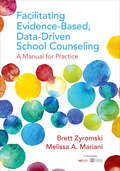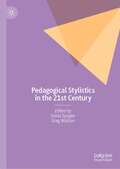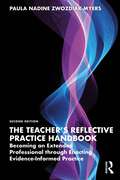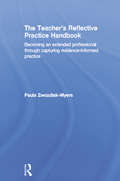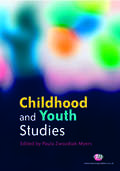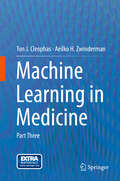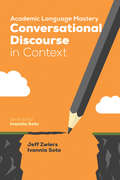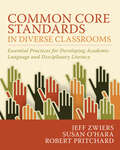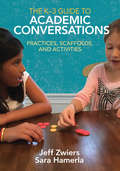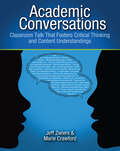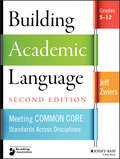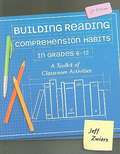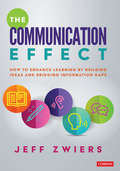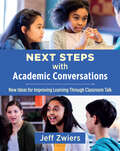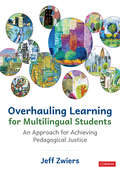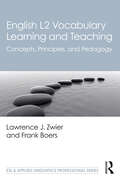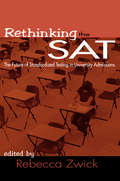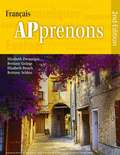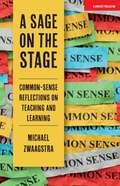- Table View
- List View
Facilitating Evidence-Based, Data-Driven School Counseling: A Manual for Practice
by Brett Zyromski Melissa A. MarianiCounselors make a difference—and now you can prove it. Your counseling makes a difference in the lives of at-risk students every day. To meet accountability standards, though, you need data the number-crunchers can understand. With this user-friendly manual, make the shift to evidence-based practices and interventions in a data-driven, comprehensive school counseling program based on ASCA’s national model. The book includes Visual guides and checklists for every step of the process Examples of successful program evolution Guidance on developing and submitting a successful Recognized ASCA Model Program (RAMP) application Supporting documents in an online resource center
Facilitating Evidence-Based, Data-Driven School Counseling: A Manual for Practice
by Brett Zyromski Melissa A. MarianiCounselors make a difference—and now you can prove it. Your counseling makes a difference in the lives of at-risk students every day. To meet accountability standards, though, you need data the number-crunchers can understand. With this user-friendly manual, make the shift to evidence-based practices and interventions in a data-driven, comprehensive school counseling program based on ASCA’s national model. The book includes Visual guides and checklists for every step of the process Examples of successful program evolution Guidance on developing and submitting a successful Recognized ASCA Model Program (RAMP) application Supporting documents in an online resource center
Pedagogical Stylistics in the 21st Century
by Sonia Zyngier Greg WatsonThis edited book provides cutting edge contributions from an international array of prominent experts who discuss the relevance of pedagogical stylistics in relation to diverse contexts and areas, including empirical approaches, corpus stylistics, creative writing, literary-linguistic criticism, students as researchers, critical discourse, academic register, text-world pedagogy, cognitive stylistics, classroom discourse, language of literary texts, L1/L2 education, EFL learners, and multimodal stylistics. Intended as a follow-up to Watson and Zyngier (2007), this volume situates the reader by offering a broad assessment of how the field has developed during the past 15 years and where it stands now. By examining both contemporary research and future challenges, it should be regarded as essential reading for all teachers, researchers, scholars, and students interested in understanding language and how to apply stylistics in educational settings. This book will be of interest to students and scholars working in stylistics, cognitive linguistics, language teaching, applied linguistics, literary studies, and materials development.
The Teacher's Reflective Practice Handbook: Becoming an Extended Professional through Enacting Evidence-Informed Practice
by Paula Nadine Zwozdiak-MyersThe Teacher’s Reflective Practice Handbook is based on a multi-dimensional framework of reflective practice designed by the author to guide and support student, early career and experienced teachers to develop high-quality teaching and maximise pupil learning. This second edition combines the intent to preserve the integrity of seminal contributions advanced by eminent scholars and practitioners over the years, with that of broadening its reach to reflect key changes in policy discourse, teacher education, school and curriculum reform underpinned by evidence-informed research on what constitutes effective teaching and learning, across the national and international landscape. Chapters invite you to engage in descriptive, comparative and critical reflective conversations across nine dimensions of reflective practice which enables you to: Question personal theories, beliefs and assumptions about teaching and consider alternative perspectives and possibilities Systematically evaluate your own teaching through classroom research procedures Try out new strategies and ideas to appropriate new knowledge and to tailor inclusive provision for all your learners Enhance the quality of and continue to improve your own teaching Including a range of reflective tasks, links to online resources, exemplification material and further reading to develop and challenge your own thinking, The Teacher’s Reflective Practice Handbook is an essential and accessible guide which supports the enactment of reflective practice through self- and peer-assessment, solution-focused learning, professional development and improvement planning to build a meaningful portfolio of evidence-informed practice.
The Teacher's Reflective Practice Handbook: Becoming an Extended Professional through Capturing Evidence-Informed Practice
by Paula Zwozdiak-MyersWhat do we mean by reflective practice? What does it involve? How can it help you develop as a teacher? The Teacher’s Reflective Practice Handbook is an essential source of advice, guidance and ideas for both student and practising teachers. Helping you to translate pedagogical knowledge into practice, this Handbook guides you through studying your own teaching for personal development, evaluating your lessons through classroom research, and enhancing the quality of pupil learning. It offers an innovative framework which serves to prepare you for the challenges and complexities of the classroom environment, and supports the continuing improvement of your teaching. Underpinned by key theoretical concepts and contemporary research within the field of education, chapters help you to: systematically evaluate your teaching through classroom research procedures question personal theories and beliefs, and consider alternative perspectives and possibilities try out new strategies and ideas to maximise the learning potential of all students enhance the quality of, and continue to improve, your teaching. Including a range of reflective tasks, links to online resources, exemplification material and further reading to help you develop your own thinking, The Teacher’s Reflective Practice Handbook is an accessible guide which supports the facilitation of reflective practice through self and peer assessment, problem-based learning and personal development planning. The multi-dimensional framework enables you to build a meaningful, personally relevant portfolio of evidence-informed practice.
Childhood and Youth Studies
by Paula Zwozdiak-MayersThis book introduces the inter-disciplinary study of childhood and youth, and the multi-agency practice of professionals who serve the needs of children, young people, and their families. Exploring key theories and central ideas, research methodology, policy, and practice, the book takes a holistic, contextual approach that values difference and diversity — for example, investigating concepts such as identity, representation, creativity and discourse, and issues such as ethnicity, gender, and the 'childhood in crisis' thesis. Further, it challenges opinion by exploring complex and controversial modern-day issues, and by engaging with a range of perspectives to highlight debates.
Machine Learning in Medicine
by Aeilko H. Zwinderman Ton J. CleophasMachine learning is a novel discipline concerned with the analysis of large and multiple variables data. It involves computationally intensive methods, like factor analysis, cluster analysis, and discriminant analysis. It is currently mainly the domain of computer scientists, and is already commonly used in social sciences, marketing research, operational research and applied sciences. It is virtually unused in clinical research. This is probably due to the traditional belief of clinicians in clinical trials where multiple variables are equally balanced by the randomization process and are not further taken into account. In contrast, modern computer data files often involve hundreds of variables like genes and other laboratory values, and computationally intensive methods are required. This book was written as a hand-hold presentation accessible to clinicians, and as a must-read publication for those new to the methods.
Academic Language Mastery: Conversational Discourse in Context
by Jeff Zwiers Ivannia M. SotoBy now it’s a given: if we’re to help our ELLs and SELs access the rigorous demands of today’s content standards, we must cultivate the “code” that drives school success: academic language. Look no further for assistance than this much-anticipated series from Ivannia Soto, in which she invites field authorities Jeff Zwiers, David and Yvonne Freeman, Margarita Calderon, and Noma LeMoine to share every teacher’s need-to-know strategies on the four essential components of academic language. The subject of this volume is conversational discourse. Here, Jeff Zwiers reveals the power of academic conversation in helping students develop language, clarify concepts, comprehend complex texts, and fortify thinking and relational skills. With this book as your roadmap, you’ll learn how to: Foster the skills and language students must develop for productive interactions Implement strategies for scaffolding paired conversations Assess student’s oral language development as you go It’s imperative that our ELLs and SELs practice academic language in rich conversations with others in school, especially when our classrooms may be their only opportunities to receive modeling, scaffolding, and feedback focused on effective discourse. This book, in concert with the other three volumes in the series, can provide both a foundation and a framework for accelerating the learning of diverse students across grade levels and disciplines.
Academic Language Mastery: Conversational Discourse in Context
by Jeff Zwiers Ivannia M. SotoBy now it’s a given: if we’re to help our ELLs and SELs access the rigorous demands of today’s content standards, we must cultivate the “code” that drives school success: academic language. Look no further for assistance than this much-anticipated series from Ivannia Soto, in which she invites field authorities Jeff Zwiers, David and Yvonne Freeman, Margarita Calderon, and Noma LeMoine to share every teacher’s need-to-know strategies on the four essential components of academic language. The subject of this volume is conversational discourse. Here, Jeff Zwiers reveals the power of academic conversation in helping students develop language, clarify concepts, comprehend complex texts, and fortify thinking and relational skills. With this book as your roadmap, you’ll learn how to: Foster the skills and language students must develop for productive interactions Implement strategies for scaffolding paired conversations Assess student’s oral language development as you go It’s imperative that our ELLs and SELs practice academic language in rich conversations with others in school, especially when our classrooms may be their only opportunities to receive modeling, scaffolding, and feedback focused on effective discourse. This book, in concert with the other three volumes in the series, can provide both a foundation and a framework for accelerating the learning of diverse students across grade levels and disciplines.
Common Core Standards in Diverse Classrooms: Essential Practices for Developing Academic Language and Disciplinary Literacy
by Jeff Zwiers Susan O'Hara Robert PritchardThe Common Core State Standards require students to do more with knowledge and language than ever before. Rather than be mere consumers of knowledge, students must now become creators, critics, and communicators of ideas across disciplines. Yet in order to take on these new and exciting roles, many students need daily teaching with an extra emphasis on accelerating their academic communication skills. Common Core Standards in Diverse Classrooms: Essential Practices for Developing Academic Language and Disciplinary Literacy describes seven research-based teaching practices for developing complex language and literacy skills across grade levels and disciplines: using complex texts, fortifying complex output, fostering academic interaction, clarifying complex language, modeling, guiding, and designing instruction. Most important, you will find clear descriptions and examples of how these essential practices can-;and should-;be woven together in real lessons. The book: Clarifieshow to support the learning of complex language that students need for reaching Common Core and other standardsProvides practical ways to realize the instructional shifts needed with the implementation of new standards in diverse classroomsIncludes frameworks and descriptions on how to develop students' complex language, speaking, and writingHelps maximize strategies and tools for building system-wide capacity for sustained growth in the practicesCommon Core Standards in Diverse Classrooms is a concise guide for helping us improve our practices to strengthen two vital pillars that support student learning: academic language and disciplinary literacy.
The K-3 Guide to Academic Conversations: Practices, Scaffolds, and Activities
by Jeff Zwiers Sara R. Hamerla“For thousands of years people have been using the skills we describe in this book to engage in conversations with others. What isn’t as prevalent, however, is instruction--especially in primary grades—in which we engage students in productive conversations about academic ideas. This book fills that very big need.” --Jeff Zwiers & Sara Hamerla Talk about content mastery . . . Primary teachers, you won’t want to miss this: if you’re looking for a single resource to foster purposeful content discussions and high-quality interpersonal engagement, then put Jeff Zwiers and Sara Hamerla’s K-3 Guide to Academic Conversations at the top of your reading list. Whether your students love to talk or not, all must be equipped with key conversation skills such as active listening, taking turns, posing, clarifying, supporting with examples, and arguing ideas. This ready resource comes packed with every imaginable tool you could need to make academic conversations part of your everyday teaching: Sample lesson plans and anchor charts Guidelines for creating effective prompts Applications across content areas, with corresponding assessments Rubrics and protocols for listening to student speech Transcripts of conversations and questions for reflection Companion website with video and downloadable resources Tens of thousands of students in the upper grades have reaped the benefits of academic conversations: high-quality face-to-face interactions, increased motivation, stronger collaborative argumentation skills, and better understanding and retention of content. The K-3 Guide to Academic Conversations is that resource for providing your primary students with the same powerful learning opportunities.
The K-3 Guide to Academic Conversations: Practices, Scaffolds, and Activities
by Jeff Zwiers Sara R. Hamerla“For thousands of years people have been using the skills we describe in this book to engage in conversations with others. What isn’t as prevalent, however, is instruction--especially in primary grades—in which we engage students in productive conversations about academic ideas. This book fills that very big need.” --Jeff Zwiers & Sara Hamerla Talk about content mastery . . . Primary teachers, you won’t want to miss this: if you’re looking for a single resource to foster purposeful content discussions and high-quality interpersonal engagement, then put Jeff Zwiers and Sara Hamerla’s K-3 Guide to Academic Conversations at the top of your reading list. Whether your students love to talk or not, all must be equipped with key conversation skills such as active listening, taking turns, posing, clarifying, supporting with examples, and arguing ideas. This ready resource comes packed with every imaginable tool you could need to make academic conversations part of your everyday teaching: Sample lesson plans and anchor charts Guidelines for creating effective prompts Applications across content areas, with corresponding assessments Rubrics and protocols for listening to student speech Transcripts of conversations and questions for reflection Companion website with video and downloadable resources Tens of thousands of students in the upper grades have reaped the benefits of academic conversations: high-quality face-to-face interactions, increased motivation, stronger collaborative argumentation skills, and better understanding and retention of content. The K-3 Guide to Academic Conversations is that resource for providing your primary students with the same powerful learning opportunities.
Academic Conversations: Classroom Talk that Fosters Critical Thinking and Content Understandings
by Jeff Zwiers Marie CrawfordConversing with others has given insights to different perspectives, helped build ideas, and solve problems. Academic conversations push students to think and learn in lasting ways. Academic conversations are back-and-forth dialogues in which students focus on a topic and explore it by building, challenging, and negotiating relevant ideas. In Academic Conversations: Classroom Talk that Fosters Critical Thinking and Content Understandings authors Jeff Zwiers and Marie Crawford address the challenges teachers face when trying to bring thoughtful, respectful, and focused conversations into the classroom. They identify five core communications skills needed to help students hold productive academic conversation across content areas: Elaborating and Clarifying Supporting Ideas with Evidence Building On and/or Challenging Ideas Paraphrasing Synthesizing This book shows teachers how to weave the cultivation of academic conversation skills and conversations into current teaching approaches. More specifically, it describes how to use conversations to build the following: Academic vocabulary and grammar Critical thinking skills such as persuasion, interpretation, consideration of multiple perspectives, evaluation, and application Literacy skills such as questioning, predicting, connecting to prior knowledge, and summarizing An academic classroom environment brimming with respect for others' ideas, equity of voice, engagement, and mutual support The ideas in this book stem from many hours of classroom practice, research, and video analysis across grade levels and content areas. Readers will find numerous practical activities for working on each conversation skill, crafting conversation-worthy tasks, and using conversations to teach and assess. Academic Conversations offers an in-depth approach to helping students develop into the future parents, teachers, and leaders who will collaborate to build a better world.
Building Academic Language: Meeting Common Core Standards Across Disciplines, Grades 5-12
by Jeff Zwiers“Of the over one hundred new publications on the Common Core State Standards (CCSS), this one truly stands out! In the second edition of Building Academic Language, Jeff Zwiers presents a much-needed, comprehensive roadmap to cultivating academic language development across all disciplines, this time placing the rigor and challenges of the CCSS front and center. A must-have resource!” —Andrea Honigsfeld, EdD, Molloy College “Language is critical to the development of content learning as students delve more deeply into specific disciplines. When students possess strong academic language, they are better able to critically analyze and synthesize complex ideas and abstract concepts. In this second edition of Building Academic Language, Jeff Zwiers successfully builds the connections between the Common Core State Standards and academic language. This is the ‘go to’ resource for content teachers as they transition to the expectations for college and career readiness.” —Katherine S. McKnight, PhD, National Louis University With the adoption of the Common Core State Standards (CCSS) by most of the United States, students need help developing their understanding and use of language within the academic context. This is crucially important throughout middle school and high school, as the subjects discussed and concepts taught require a firm grasp of language in order to understand the greater complexity of the subject matter. Building Academic Language shows teachers what they can do to help their students grasp language principles and develop the language skills they’ll need to reach their highest levels of academic achievement. The Second Edition of Building Academic Language includes new strategies for addressing specific Common Core standards and also provides answers to the most important questions across various content areas, including: What is academic language and how does it differ by content area? How can language-building activities support content understanding for students? How can teachers assist students in using language more effectively, especially in the academic context? How can academic language usage be modeled routinely in the classroom? How can lesson planning and assessment support academic language development? An essential resource for teaching all students, this book explains what every teacher needs to know about language for supporting reading, writing, and academic learning.
Building Reading Comprehension Habits in Grades 6-12: A Toolkit of Classroom Activities (Second Edition)
by Jeff ZwiersThis second edition succinctly describes practical ideas, including more than 15 new activities, which have been working in a wide range of middle school and high school classrooms. The author has used the ideas, seen them used by others, and researched their effectiveness in a variety of settings.
The Communication Effect: How to Enhance Learning by Building Ideas and Bridging Information Gaps
by Jeff ZwiersThe &“communication effect&” is what happens when we saturate our classrooms with authentic communication, which occurs when students use language to build up ideas and do meaningful things. For starters, authentic communication deepens and increases language development, learning of content concepts and skills, rigor and engagement, empathy and understanding of others&’ perspectives, agency and ownership of core ideas across disciplines, and social and emotional skills for building strong relationships. And these are just the starters. With The Communication Effect, Dr. Jeff Zwiers challenges teachers in Grades 3 and up to focus less on breadth and more on depth by grounding instruction and assessment in authentic (rather than pseudo-) communication. This book provides: Ideas for cultivating classroom cultures in which authentic communication thrives Clear descriptions and examples of the three features of authentic communication: 1. building up key ideas (claims and concepts); 2. clarifying terms and supporting ideas; and 3. creating and filling information gaps Over 175 suggestions for using the three features of authentic communication to enhance twenty commonly used instructional activities across disciplines Additional examples of not-so-commonly-used activities that embody the three features Suggestions for improving four different types of teacher creativity needed to design effective lessons, activities, and assessments that maximize authentic communication Our students deserve to get the most out of each minute of each lesson. Authentic communication can help. As you read The Communication Effect and apply its ideas, you will see how much better equipped and inspired your students are to grow into the amazing and gifted people that they were meant to become.
The Communication Effect: How to Enhance Learning by Building Ideas and Bridging Information Gaps
by Jeff ZwiersThe &“communication effect&” is what happens when we saturate our classrooms with authentic communication, which occurs when students use language to build up ideas and do meaningful things. For starters, authentic communication deepens and increases language development, learning of content concepts and skills, rigor and engagement, empathy and understanding of others&’ perspectives, agency and ownership of core ideas across disciplines, and social and emotional skills for building strong relationships. And these are just the starters. With The Communication Effect, Dr. Jeff Zwiers challenges teachers in Grades 3 and up to focus less on breadth and more on depth by grounding instruction and assessment in authentic (rather than pseudo-) communication. This book provides: Ideas for cultivating classroom cultures in which authentic communication thrives Clear descriptions and examples of the three features of authentic communication: 1. building up key ideas (claims and concepts); 2. clarifying terms and supporting ideas; and 3. creating and filling information gaps Over 175 suggestions for using the three features of authentic communication to enhance twenty commonly used instructional activities across disciplines Additional examples of not-so-commonly-used activities that embody the three features Suggestions for improving four different types of teacher creativity needed to design effective lessons, activities, and assessments that maximize authentic communication Our students deserve to get the most out of each minute of each lesson. Authentic communication can help. As you read The Communication Effect and apply its ideas, you will see how much better equipped and inspired your students are to grow into the amazing and gifted people that they were meant to become.
Next Steps with Academic Conversations: New Ideas for Improving Learning Through Classroom Talk
by Jeff ZwiersDr. Jeff Zwiers, an educational researcher at Stanford University, has spent the last 15 years analyzing classroom conversations to see how they can be better used and improved in classroom settings. Teachers who have worked with him report significant growth in students&’ engagement, content learning, language, creativity, and sense of agency. Zweirs introduced his initial vision for classroom conversations Academic Conversations: Classroom Talk that Fosters Critical Thinking and Content Understanding. His follow-up book, Next Steps with Academic Conversations: New Ideas for Improving Learning Through Classroom Talk , expands the first book with updated classroom strategies and practices. In this new version, teachers will discover: How to introduce buildable ideas and teach students how to develop and support them Equitable classroom discussions and how diverse backgrounds conversing can benefit social skills and emotional intelligence Highlights of new research-based theories on classroom conversation Ways to develop students' confidence in conversation and how classroom skills can apply to real world interactions This resource is the product of his extensive research, co-teaching, and collaborating with a wide range of educators. It was written for busy teachers who want a practical guide for strengthening the quality and quantity of productive conversations in their lessons.
Overhauling Learning for Multilingual Students: An Approach for Achieving Pedagogical Justice
by Jeff ZwiersAdopt a strengths-based, justice-centered approach to teaching multilinguals Offering educators a path to pedagogical justice for multilingual learners, Overhauling Learning for Multilingual Students outlines a comprehensive alternative model for instruction and assessment. With an emphasis on engaging multilingual learners in authentic communication and promoting student agency and creativity, this book is an urgent call-to-action for educators at all levels to value and leverage the many assets that multilingual students bring to every classroom. The book outlines six dimensions of pedagogical justice and offers practical strategies to implement a learner-centered approach that will help all students thrive. Additional features include: An assets-based framework designed to help multilingual learners learn and grow Guidance for shifting instructional strategies away from remediation and test preparation toward an engaging, justice-centered approach Activities to to help students collaboratively build up unique and important ideas (claims and concepts) across disciplines Written by scholar, practitioner, and best-selling author, Jeff Zwiers, Overhauling Learning for Multilingual Students supports educators to de-think and rethink traditional one-size-fits-all approaches to teaching and assessing multilingual learners.
Overhauling Learning for Multilingual Students: An Approach for Achieving Pedagogical Justice
by Jeff ZwiersAdopt a strengths-based, justice-centered approach to teaching multilinguals Offering educators a path to pedagogical justice for multilingual learners, Overhauling Learning for Multilingual Students outlines a comprehensive alternative model for instruction and assessment. With an emphasis on engaging multilingual learners in authentic communication and promoting student agency and creativity, this book is an urgent call-to-action for educators at all levels to value and leverage the many assets that multilingual students bring to every classroom. The book outlines six dimensions of pedagogical justice and offers practical strategies to implement a learner-centered approach that will help all students thrive. Additional features include: An assets-based framework designed to help multilingual learners learn and grow Guidance for shifting instructional strategies away from remediation and test preparation toward an engaging, justice-centered approach Activities to to help students collaboratively build up unique and important ideas (claims and concepts) across disciplines Written by scholar, practitioner, and best-selling author, Jeff Zwiers, Overhauling Learning for Multilingual Students supports educators to de-think and rethink traditional one-size-fits-all approaches to teaching and assessing multilingual learners.
English L2 Vocabulary Learning and Teaching: Concepts, Principles, and Pedagogy (ESL & Applied Linguistics Professional Series)
by Lawrence J. Zwier Frank BoersAccessible to experts and non-experts alike, this text is a comprehensive entry to teaching and learning vocabulary in ESL and EFL contexts. Firmly grounded in research, it presents frameworks and methods for teaching vocabulary to English L2 speakers. Overviewing key topics as well as providing in-depth research analyses and critiques, Zwier and Boers address all major areas of vocabulary pedagogy and instruction. Organized in four parts, chapters cover the nature of vocabulary and strands of vocabulary research; curricular approaches; and techniques and activities. Readers are introduced to key topics, including teaching multiword expressions, assessment, discourse, and instruction at different levels. Each chapter includes questions, prompts, and activities to foster discussion. A foundational textbook for courses on L2 instruction and teacher-training courses, it is an essential text for students and scholars in TESOL and Applied Linguistics, and provides the pedagogical grounding future English L2 teachers need to effectively teach vocabulary.
Rethinking the SAT: The Future of Standardized Testing in University Admissions
by Rebecca ZwickRethinking the SAT is a unique presentation of the latest thoughts and research findings of key individuals in the world of college admissions, including the president of the largest public university system in the U.S., as well as the presidents of the two companies that sponsor college admissions tests in the U.S. The contributors address not only the pros and cons of the SAT itself, but the broader question of who should go to college in the twenty-first century.
Who Gets In?: Strategies for Fair and Effective College Admissions
by Rebecca ZwickOn the disputed topic of U.S. college admissions, everyone agrees that this high-stakes competition is unfair. But few agree on what a fair process would be. Stressing transparency in evaluating applicants, Rebecca Zwick assesses the goals and criteria of different admissions policies and shows how they can fail to produce the desired results.
Apprenons: Francais
by Elizabeth Zwanziger Brittany Goings Elizabeth Rench Brittany Selden GriffinNIMAC-sourced textbook
A Sage on the Stage: Common Sense Reflections on Teaching and Learning
by Michael ZwaagstraA collection of articles on what works for teachers and learners in the classroom - and what doesn't. Covers topics from school discipline to content knowledge to no-zero policies. Michael Zwaagstra is a public high school teacher and author. He has extensive teaching experience at a variety of grade levels and currently teaches high school social studies in Manitoba.
